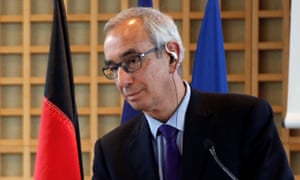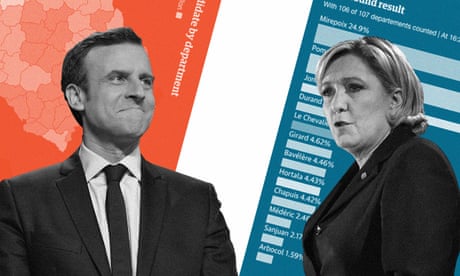UK can expect Macron to be tough on Brexit, key adviser warns – 10.5.2017
Macron será un negociador duro de BREXIT.
Emmanuel Macron does not favour a hard Brexit but will be a tough negotiator in the UK’s talks to leave the European Union, according to the French president-elect’s chief economic adviser.
Jean Pisani-Ferry, who is tipped to play a leading role in Macron’s government, said the UK and Europe shared a mutual interest in maintaining economic prosperity.
Macron, who won the second round of the French election on Sunday, has said Brexit will not be a walk in the park for the UK. In the past he has described the referendum result as a “crime” for which Britain should be punished by a “total exit”, and said the UK foreign secretary, Boris Johnson, was prone to making flamboyant speeches but had no strategic vision.
In the run-up to the referendum, Macron also warned against the “Guernseyfication” of the UK, saying that by voting to leave the country would “isolate itself and become a trading post and arbitration place at Europe’s border”.
There are fears in Whitehall that Macron, intent on forming a renewed alliance with the German chancellor, Angela Merkel, will take a tough line on the terms of Britain’s access to the single market. He has already said the UK must be subject to the European court of justice throughout the transition period.
He has also called for the bilateral Le Touquet agreement covering the mutual policing of migrants in Calais to be revisited, and potentially scrapped, because he says it is not fair and leaves too many migrants waiting in France for a British decision.

Jean Pisani-Ferry is expected to play a key role in Macron’s government. Photograph: Charles Platiau/Reuters
Asked by BBC Radio 4’s Today programme whether Macron favoured a hard Brexit, Pisani-Ferry said: “I don’t think anybody has an interest in a hard Brexit. I think we need to build a new relationship. There is a mutual interest in keeping prosperity that exists and has built over the years.”
But Pisani-Ferry said Macron would certainly not seek to punish Britain. “He believes that even today Europe is part of the solution to the problems we are facing. He is a very committed pro-European and he is not the kind of man who would implicitly agree with the dismantling of the EU. He is very keen on building more integration. He’s very keen on strengthening the eurozone.”
Peter Ricketts, a former UK ambassador to France, said of Macron: “Brexit will not be at the top of his priorities. Brexit is an affront to everything he believes in. He thinks it is a serious mistake, but he will see it as an opportunity to move the 27 member states forward. That will be his priority. He will not want to punish Britain. He will want a deal, he is a deal-maker by nature, he will want to drive a tough bargain and ensure Britain has lost by leaving the EU, but he will not want a disaster and a failure”.
Simon Fraser, a former Foreign Office permanent secretary, agreed: “Macron likes us, he likes the City of London and he is an economic liberal.”
Lord Ricketts predicted that Macron’s preoccupation, away from domestic reform, would be building a new relationship with Germany and reviving plans once touted by his predecessor, François Hollande, to strengthen euro-governance and allow more fiscal transfers within the union. He said the Germans ought to be willing to accept this, although many are sceptical Germany will ever accept looser deficits.
Ricketts admitted he was puzzled by Macron’s stance on the Touquet agreement, since the crisis at the Calais migrant camp had eased. He said a marker of Macron’s intentions would be whether he gives a big job to Xavier Bertrand, president of the Hauts-de-France region that contains Calais and long-term advocate of stronger action. Bertrand backed Macron in the final round, but urged him after the result not to forget the reasons for the anger and anxiety of Le Pen’s supporters.
If Macron’s ambitious campaign rhetoric is to be believed, the contours of a new Europe– more integrated on defence, the euro and social solidarity – will be taking shape in 2019 in democratic conventions across Europe just as Brexit negotiations reach their denouement.
With the clock ticking on the talks, May is having little success with her attempts to divide the EU – either by flattering EU industrialists or wooing the eastern Europeans. Indeed, far from accelerating the weakening of Europe, or its disintegration, Brexit has proved to be a unifying force. EU leaders have been surprised by how quickly they have agreed their negotiating stance on Brexit. For Europeans, Brexit and the first 100 days of Donald Trump have made it easier to challenge the simple answers populism provides.
Fuente: https://www.theguardian.com/world/2017/may/08/uk-can-expect-macron-to-be-tough-on-brexit-key-adviser-warns
OOOOOOOOOOOOOOOOOOOOOOOOOO
Virutas…. 9.5.2017 Francia
Opinión: es hora del “Merkron”
El nuevo presidente de Francia encontrará una fuerte resistencia entre los políticos de su país. Pero, él tiene que tener la fuerza necesaria para estabilizar la UE. Esperemos que junto a Alemania, opina Bernd Riegert.
OOOOOOOOOOOOOOOOOOOOOOOOOOOOOOOO
Pugna ideológica al interior del Frente Nacional
Tras su derrota en las elecciones presidenciales, Marine Le Pen piensa en una reestructuración del Frente Nacional. La líder del partido de ultraderecha es blanco de críticas internas.
OOOOOOOOOOOOOOOOOOOOOOOOOOOOOOOOOOO
Natalie Nougayrède writes in the Guardian that voters should not assume a Le Pen defeat is a done deal. Leftwingers and ultra-conservatives could yet hand the French presidency to the Front National candidate – by refusing to back Macron.
















